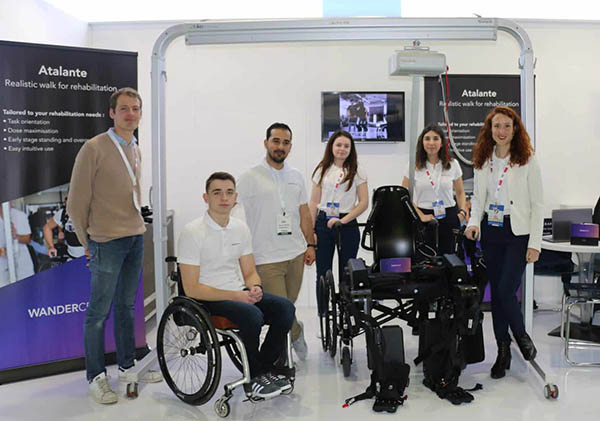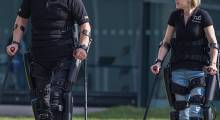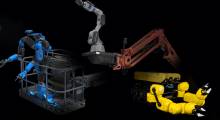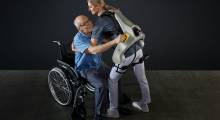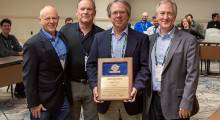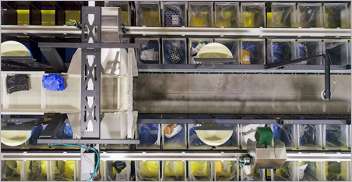Of all the robotics technologies that promise to help people, none is more directly assistive than exoskeletons. Wandercraft last week said it has raised €39.69 million ($45 million U.S.) in Series C funding. The Paris-based company said it plans to use the equity financing to continue developing its Atalante lower-body exoskeleton for rehabilitation.
“With the support of patients, medical professionals and the deep tech community, Wandercraft’s team has created a unique technology that improves rehabilitation care and will soon enable people in wheelchairs to regain autonomy and improve their everyday health,” said Matthieu Masselin, CEO of Wandercraft.
As chairman of the robotics club at the Ecole Polytechnique, Nicolas Simon began working on humanoid robots in 2010. In 2012, Simon, Masselin, Jean-Louis Constanza, and Alexandre Boulanger founded Wandercraft. Constanza, chief business and clinical officer, worked to help his wheelchair-bound son walk.
In 2017, the company began conducting trials of its exoskeleton prototype to aid paraplegic people.
Global needs drive exoskeleton development
While the technology for exoskeletons is advancing, the need is great. There were only 8,741 units worldwide in 2020, said Grand View Research, but more than 296,000 people in the U.S. alone suffer from spinal cord injuries, according to the National Spinal Cord Injury Statistical Center (NSCISC).
Grand View Research predicted an 11% compound annual growth rate (CAGR) in units and an 18% CAGR in market value between 2022 and 2030.
Up to 1 billion people, or about 15% of the world's population, has disabilities, and aging populations are also increasing demand, said Mordor Intelligence. The research firm forecast a market CAGR of 12.5% between 2020 and 2026.
For the same period, 360 Research Reports said the global exoskeleton market could grow from $360 million in 2020 to $3.3 billion by 2026 at a CAGR of 45.3%.
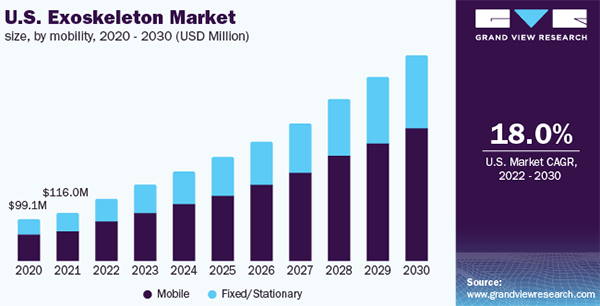
Atalante designed for ease of use
In 2019, Wandercraft began commercializing its technology as Atlante, which is now used in rehabilitation hospitals to help stroke and spinal cord injury patients relearn gait. The self-balanced exoskeleton has received CE certification in Europe.
Atalante is designed to emulate human walking with 12 actuated degrees of freedom and dynamic algorithms. Wandercraft said its wearable device can help gait training through repetitive motion and is hands-free, allowing wearers to conduct daily tasks.
Atalante's user interface is designed to minimize setup and training time for therapists and patients, allowing them to set personalized goals, said Wandercraft.
Wandercraft has sold research units in the U.S. and planned to submit its system to the Food and Drug Administration last year for approval. The company said its goal of “mobility for all” is to provide mobility to millions of people within a few years.
Investors join Wandercraft team
New York-based Quadrant Management Inc. led Wandercraft's Series C round, with participation from existing investors Bpifrance, Xange, Eurazeo, LBO France, and Cemag Invest. New investors MACSF, Malakoff Humanis, AG2R La Mondiale, Mutuelles Impact, and Sofiouest also participated.
“We are proud to have also gathered a fantastic investor team,” said Masselin. “Quadrant, with their experience in the healthcare market, is a cornerstone for our deployment in the USA. Bpifrance is a long-standing growth partner and embodies the support of France, our home country.”
“The entry of strong insurance and impact funds shows how our walk exos are valued by healthcare systems and society,” he added. “This is the ideal team to help us deliver a life-changing exoskeleton, moving from rehabilitation to daily life mobility. “
“We are thrilled to lead this round of financing and to bring together these responsible investors in order to make the world better,” said Alan Quasha, chairman and CEO of Quadrant Management. “Wandercraft has developed the world’s most advanced technology in walk robotics and markets the first self-stabilised exoskeletons.”
“We share Wandercraft’s ambition to provide a new solution for mobility, and to improve the health of millions of people using wheelchairs,” added Quasha, who will join Wandercraft’s board of directors. “We believe that they will transform mobility and become the leading player in the market.”
“Wandercraft built a unique experience in robotics, medical technologies, and in implementing global growth around their desire to bring autonomy to people with reduced mobility,” stated Emmanuel Audouard, director of Transversal Venture Capital Investments at Bpifrance. “Today, they are one of the most successful French deep-tech companies.”
“Wandercraft has succeeded in developing a revolutionary exoskeleton for the treatment of patients whose daily autonomy has been impaired,” said Stanislas Subra, head of investments at MACSF Group, an insurer for healthcare professionals. Subra will also join Wandercraft's board of directors.
Bryan, Garnier & Co., the European growth investment bank, acted as private placement agent for the financing.
Article topics
Email Sign Up

